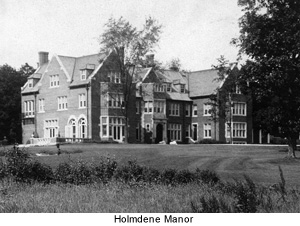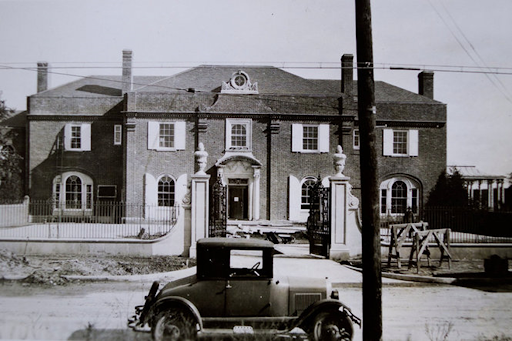By: John Wofford ‘12
Published on
 Delos A. Blodgett was a successful business owner who lived at various times across
the United States, with interests in lumber, banking and real estate. Moving to the
Upper Peninsula in 1848, Blodgett became a sawmill foreman, from which much of his
early success extended into larger and larger ventures. Blodgett’s impact, and that
of his children, is a story intrinsically linked to the history of Michigan, as their
success was used for the good of those around them. A vital part of this story is
found in the history of two buildings still standing in Grand Rapids, testaments to
the legacy of Delos’ fortunes and the work of his offspring.
Delos A. Blodgett was a successful business owner who lived at various times across
the United States, with interests in lumber, banking and real estate. Moving to the
Upper Peninsula in 1848, Blodgett became a sawmill foreman, from which much of his
early success extended into larger and larger ventures. Blodgett’s impact, and that
of his children, is a story intrinsically linked to the history of Michigan, as their
success was used for the good of those around them. A vital part of this story is
found in the history of two buildings still standing in Grand Rapids, testaments to
the legacy of Delos’ fortunes and the work of his offspring.
The children of Delos and his wife Jennie, John Wood Blodgett and Susan Richmond Lowe,
carried on the legacy of their father through their own ambitious ventures. John became
president of the Muskegon Boom Company - a lumbering operation that was among the
world’s most successful - and eventually chairman of Blodgett Company, Ltd., after
the passing of his father. John would later establish Blodgett Hospital of Grand Rapids.
His sister Susan was herself passionate about healthcare, establishing Butterworth
Hospital with her husband Edward.
Among the contributions of the Blodgett family to Grand Rapids stands two manors of
historic significance, built to evoke the architectural styles of classical kings
and English elegance. These buildings, once homes - John and his wife at one, and
Susan and her husband at another - are a timeless part of Grand Rapids lore, and details
of their lengthy construction have been pored over by historians local and otherwise.
At what is often seen as the “head” of the Aquinas College campus stands a stately
manor, preserved for many years and currently housing the College’s administrative
offices. It is the former home of Susan Richmond Lowe and her husband Edward. Edward,
then a member of the successful logging business of Susan’s father Delos, purchased
in 1905 the 69-acre dairy farm upon which the building would eventually sit.
This property became Holmdene, one of the most widely recognized buildings of the
Aquinas campus, but once a home for the Lowes. Construction on the property began
in 1906, in what would become a two-year undertaking. The estate was funded through
a gift given to Susan by her father—exactly one-third of his entire business fortune
upon retirement, the other portions divided between himself and his son John. Nearly twenty years later, John Wood Blodgett - brother to Susan and son to Delos
- would begin work with his wife Minnie on the Brookby Estate, on the corner of Robinson
Road and Plymouth. At the completion of construction on their eight-acre estate in
winter 1928, the Blodgett family moved into their home, which stands as a testament
to a time of resurgent interest in European architecture from the period between the
mid 1700s and early 1800s.
Nearly twenty years later, John Wood Blodgett - brother to Susan and son to Delos
- would begin work with his wife Minnie on the Brookby Estate, on the corner of Robinson
Road and Plymouth. At the completion of construction on their eight-acre estate in
winter 1928, the Blodgett family moved into their home, which stands as a testament
to a time of resurgent interest in European architecture from the period between the
mid 1700s and early 1800s.
Known as Georgian architecture, the style is most often associated with four Monarchs
of England - George I, II, III, and IV - all who reigned during the height of its
popularity. With the revival of this royally esteemed architecture, and the transplant
of seven elm trees to be placed at the grounds of the estate, the property was dubbed
“Brookby” after the small steam that ran through the grounds. The couple’s home at
Brookby, closely designed in tandem with architects from New York, was one of their
last achievements together, as Minnie died three years later.
The Brookby Estate has been a recognized Michigan State Historic Site since the late
70’s and was listed on the National Register in 1983. The Lowe Estate was eventually
sold to house first the University of Grand Rapids, then Aquinas College in 1945.
Wrapped up in these institutions is a family history of success and philanthropy that
is as much a personal history as it is a narrative of the growth and development of
the city. As Aquinas College celebrates its 125th anniversary, it is pleased to bring
Brookby and Holmdene back together in recognition of the vital contributions of the
Blodgett and Lowe families to the people of Grand Rapids.